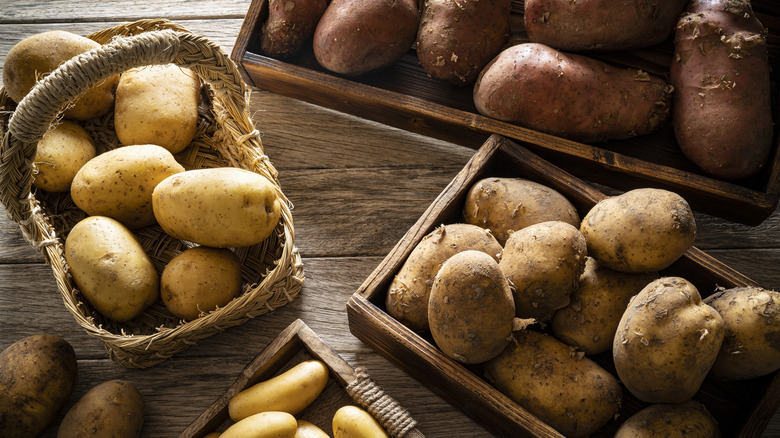Gordon Ramsay's Secret To Better Potatoes Lies In The Water
On their own, potatoes aren't the most flavorful ingredient. But throw in some salt and fat, and you open up a world of delicious snacks (fries, mashed potatoes, hash browns — need we go on?) In order to master your potato dishes, however, it's important to know how to properly cook them. Boiling potatoes seems straightforward enough, and yet it's not uncommon to be stuck with potatoes that are falling apart on the outside but still rock hard in the center (this is especially true of larger varieties, such as russet). The key to boiling potatoes, according to chef Gordon Ramsay, is to place them into the pot while the water is still cold, rather than boiling. That way, as the water boils, the potatoes will cook evenly with a perfect consistency all the way through.
When boiling your potatoes, you should generally let them sit for 10 to 20 minutes once the water is boiling, although the time is dependent on their size, whether they're pre-chopped, and the dish you are using them for. In general, it's better to let them soften up more for mashed potatoes (about 30 minutes or so), but less for dishes where they need to hold their shape (such as a Texas-style potato salad or curry). Remember to periodically check your potatoes' softness as they boil by piercing them with a fork.
Additional tips for boiling your potatoes
Even with Gordon Ramsay's water trick, it's still important to know the other ways to achieve perfectly boiled potatoes. One key factor is choosing the right type of potato to boil. If you're looking to boil your potatoes before grilling them — or hoping they'll keep their shape so you can dice them up – it's better to use waxy or all-purpose potatoes, such as gold, red, Yukon, or fingerling. These varieties are high in moisture but low in starch, which will ensure they stay intact. On the other hand, Russet potatoes (the large, brown ones) work best for mashed potatoes, as they have a great, fluffy texture but tend to fall apart.
Another simple — but crucial — step in boiling your potatoes is salting the water. The potatoes will absorb the salt, which infuses them with much-needed flavor. A good rule to follow is 1 teaspoon per pound of potatoes, but don't be shy when salting – most of the salt will be discarded with the water after cooking anyway. When adding salt, it's best to do so before adding your potatoes to the water; that way, they can sit and soak in the flavor while cooking. Or, besides boiling potatoes, you can dunk your baked potatoes in a salt water brine before they go into the oven.


